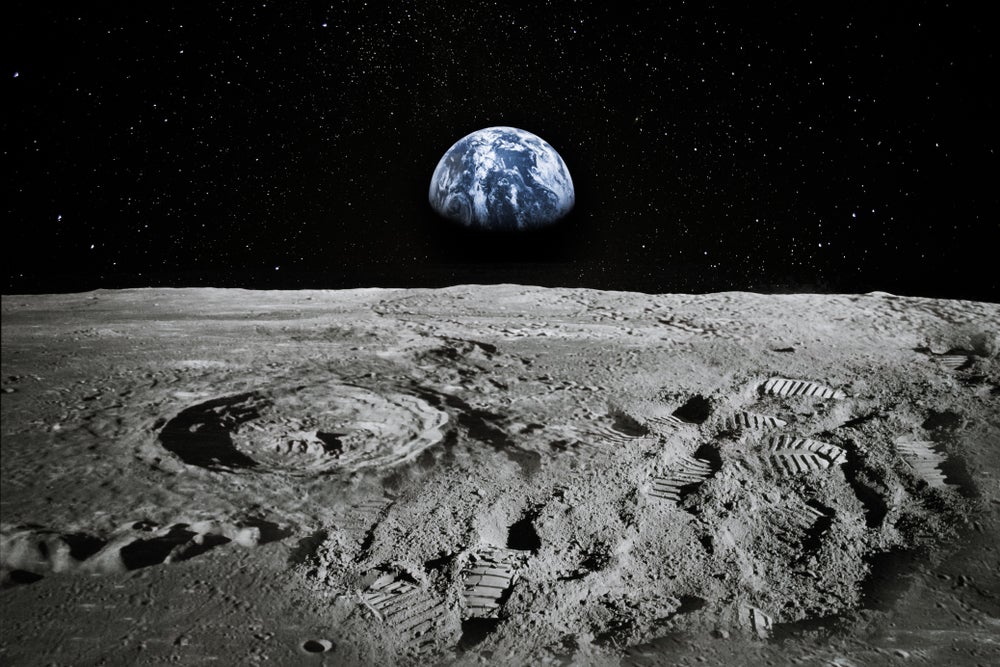The trouble with legislation is that sometimes you look at it over a decade later and wonder what the thinking behind it was—an example is the US 2011 Wolf Amendment, a piece of legislation few experts outside the space world will have heard of.
The Wolf Amendment prohibits the use of government funds by the National Aeronautics and Space Administration (NASA) for bilateral cooperation with China or its agencies without authorisation from Congress or the Federal Bureau of Investigation (FBI). It effectively bans the space agency from routinely working with its Chinese counterpart.
It is relevant now because, as a result of its recent successful lunar landing, the government of China now possesses something that no other humans have ever had. As described by CNN this week, following the successful return of the recent Chang’e-6 mission, China has rocks and soil from the far side of the moon.
The special delivery of lunar rocks on June 25 2024, was a scientific coup that cemented China’s place as one of the world’s top space powers, rivalled only by the United States. (It should be pointed out that it is only eleven months since India became the fourth country to successfully land on the Moon when its Chandrayaan-3 mission touched down near the lunar south pole on August 23, 2023.)
Share and share alike
When it comes to international cooperation, China’s and America’s scientists are on a different planet, so to speak, from their politicians.
“China welcomes scientists from all countries to apply (to study the samples) and share in the benefits,” said Liu Yunfeng, director of the international cooperation office of the China National Space Administration (CNSA), during a news conference in Beijing.

US Tariffs are shifting - will you react or anticipate?
Don’t let policy changes catch you off guard. Stay proactive with real-time data and expert analysis.
By GlobalDataNASA Administrator Bill Nelson told CNN he is “pleased to hear CNSA intends to share” the materials—namely, lunar dust and rocks—collected by the Chinese lunar probe from an ancient crater on the moon’s far side.
“Make it available to the international community just as we will when we start bringing additional samples back, and as we did a half a century ago with the samples brought back from the six Apollo moon landings,” Nelson said, though one might wish he had phrased things a bit more graciously and avoided using an imperative sentence.
China has a track record of landing robotic spacecraft on the moon. Its Chang’e-4 mission in January 2019 was the first-ever soft landing on the far side of the Moon. A year later, China became only the third nation in history to successfully return samples from the side of the moon that faces Earth, with the successful completion of the Chang’e-5 mission.
China made those samples available to scientists in August 2023 and NASA-funded researchers were allowed to apply for access to them.
“We are going through the process right now with our scientists and our lawyers to make sure that the instructions and guardrails that the Chinese are insisting on … are not a violation of the law, the Wolf Amendment,” Nelson told CNN. “As of this moment, I don’t see a violation.” A similar process would apply to getting access to samples from the Chang’e-6 mission.
In 2019, a Harvard International Review article, “Trouble in the Stars: The Importance of US-China Bilateral Cooperation in Space,” argued that while the Wolf Amendment was passed to prevent accidental technology transfers with China—due to the dual-use nature of space technologies for both civilian and military purposes—the amendment proves contrary to its intents and increases the risk of war in space.
It claimed that the Wolf Amendment ultimately undermines an international culture of multilateralism in space by sowing distrust between major space superpowers, increasing the potential for misunderstandings and tensions given their lower levels of continued communication and cooperation on space-related issues.
Speedbumps in the road
The goals of the Amendment, through its original sponsor, Representative Frank Wolf of Virginia, was to put ‘speedbumps’ in front of the White House’s Office of Science and Technology Policy (OSTP) and NASA, as they wanted to engage with bilateral agreements in coordination with China.
There was an interest in not helping the Chinese develop their space capabilities and specifically keeping the country out of the International Space Station. The Amendment restricted bilateral, not multilateral meetings, and placed no restrictions on activities involving individual Chinese nationals unless they were acting as official representatives of the Chinese government.
In his discussion of ten years of the Wolf Amendment, US astronaut Charles Bolden recounts how he travelled to China to meet with representatives of the Chinese Space Agency and evaluate the feasibility of working cooperatively with them in human spaceflight. The result, after meeting with Wolf upon his return, was a cut in the OSTP budget and an amendment to NASA’s budget that limited bilateral activities.
Finding a way forward from the Wolf Amendment
What might be a solution to the Wolf Amendment problem? Jim Head, a planetary scientist at Brown University, told Scientific American that rather than waiting for the White House to change the Amendment, one option might be for scientists to petition Congress for an exception so that they can work bilaterally with their Chinese peers on space projects. Or for China to become a signatory of the Artemis Accords, a set of principles to guide the exploration and use of outer space.
There are no simple solutions. What is clear however, is that the Wolf Amendment of 2011, driven in large part by Congressman Wolf’s concerns about human rights, is not helping the US and China work together on space coordination issues, such as space traffic management, and the role of space in the context of climate change. It is time for corrective action.









